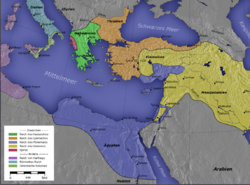Ptolemies
| Ptolemaic Kingdom | ||||||||||||
| Πτολεμαϊκὴ βασιλεία Ptolemaïkḕ basileía |
||||||||||||
|
||||||||||||
|
The Ptolemaic Kingdom in 300 BC (in blue).
|
||||||||||||
| Capital | Alexandria | |||||||||||
| Languages |
Greek (official) Egyptian (common) |
|||||||||||
| Religion | Cult of Serapis | |||||||||||
| Government | Hellenistic monarchy | |||||||||||
| Pharaoh | ||||||||||||
| • | 305–283 BC | Ptolemy I Soter (first) | ||||||||||
| • | 51–30 BC | Cleopatra VII (last) | ||||||||||
| Historical era | Classical antiquity | |||||||||||
| • | Established | 305 BC | ||||||||||
| • | Disestablished | 30 BC | ||||||||||
| Currency | Greek Drachma | |||||||||||
|
||||||||||||
| Today part of |
|
|||||||||||
The Ptolemaic Kingdom (/ˌtɒləˈmeɪ.ɪk/; Ancient Greek: Πτολεμαϊκὴ βασιλεία, Ptolemaïkḕ basileía) was a Hellenistic kingdom based in Egypt. It was ruled by the Ptolemaic dynasty which started with Ptolemy I Soter's accession after the death of Alexander the Great in 323 BC and which ended with the death of Cleopatra VII and the Roman conquest in 30 BC.
The Ptolemaic Kingdom was founded in 305 BC by Ptolemy I Soter, who declared himself Pharaoh of Egypt and created a powerful Hellenistic dynasty that ruled an area stretching from southern Syria to Cyrene and south to Nubia. Alexandria became the capital city and a major center of Greek culture and trade. To gain recognition by the native Egyptian populace, they named themselves the successors to the Pharaohs. The later Ptolemies took on Egyptian traditions by marrying their siblings, had themselves portrayed on public monuments in Egyptian style and dress, and participated in Egyptian religious life. The Ptolemies had to fight native rebellions and were involved in foreign and civil wars that led to the decline of the kingdom and its final annexation by Rome. Hellenistic culture continued to thrive in Egypt throughout the Roman and Byzantine periods until the Muslim conquest.
...
Wikipedia


